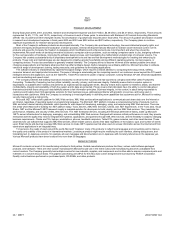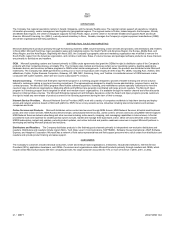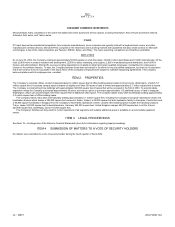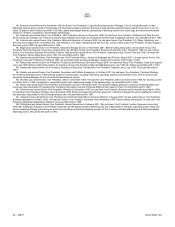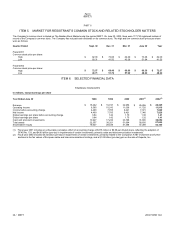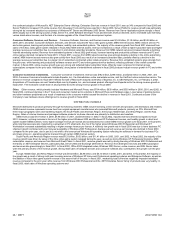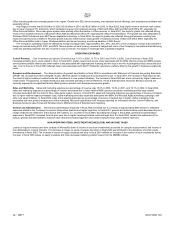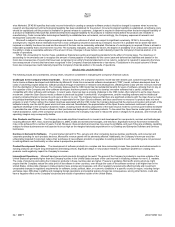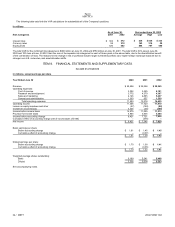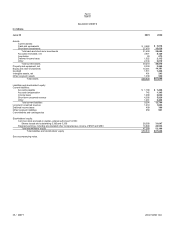Microsoft 2002 Annual Report Download - page 27
Download and view the complete annual report
Please find page 27 of the 2002 Microsoft annual report below. You can navigate through the pages in the report by either clicking on the pages listed below, or by using the keyword search tool below to find specific information within the annual report.
MSFT 29 / 2002 FORM 10-K
Part II
Item 7
Office licensing produced moderate growth in the region. Growth from SQL Server licensing, new hardware device offerings, and entertainment software was
especially strong.
Asia Region revenue was $2.60 billion in 2000, $3.06 billion in 2001, and $2.83 billion in 2002. In fiscal 2002, Asia region revenue declined most notably
due to lower consumer PC shipments, which hampered revenue from localized versions of Microsoft Office 2000 and Microsoft Office XP, especially the
Office Personal Edition. Xbox video game system sales partially offset the decline in Office revenue. In fiscal 2001, the region’s growth rate reflected strong
revenue from localized versions of Microsoft Office 2000 and Microsoft Office XP, especially the Office Personal Edition. This growth was also attributable to
Windows 2000 Professional and .NET Server applications licensing. In fiscal 2000, the region’s growth rate reflected strong performance resulting from
improved local economic conditions. Revenue growth was also influenced by robust growth of localized versions of Microsoft Office 2000, especially the
Office Personal Edition sold in Japan, Windows platform and server licensing, and strong adoption of SQL Server.
The Company’s operating results are affected by foreign exchange rates. Approximately 30%, 27%, and 25% of the Company’s revenue was collected in
foreign currencies during 2000, 2001, and 2002. Since a portion of local currency revenue is hedged and much of the Company’s international manufacturing
costs and operating expenses are also incurred in local currencies, the impact of exchange rates is partially mitigated.
OPERATING EXPENSES
Cost of Revenue. Cost of revenue as a percent of revenue was 13.1% in 2000, 13.7% in 2001, and 18.3% in 2002. Cost of revenue in fiscal 2002
increased primarily due to costs related to Xbox. In fiscal 2001, higher support and service costs associated with the MSN Internet access and MSN network
services were partially offset by the lower relative costs associated with organizational licensing and the drop in the mix of packaged product versus the prior
year. Cost of revenue in fiscal 2000 reflected lower costs associated with WebTV Networks’ operations, partially offset by the growth in hardware peripherals
costs.
Research and Development. The discontinuation of goodwill amortization in fiscal 2002 in accordance with Statement of Financial Accounting Standards
(SFAS) 142, Goodwill and Other Intangible Assets, offset the growth in headcount and development costs. In fiscal 2001, the increase in R&D expense was
the result of higher headcount-related costs and investments in new product initiatives. The increase in fiscal 2000 was driven primarily by higher headcount-
related costs. Prospectively, increased headcount and increased spending in Server Platforms, Home & Entertainment, Business Solutions and CE are
currently expected to be significant factors affecting future research and development expense growth.
Sales and Marketing. Sales and marketing expense as a percentage of revenue was 18.0% in 2000, 19.3% in 2001, and 19.1% in 2002. In fiscal 2002,
sales and marketing expense as a percentage of revenue decreased due to lower relative MSN customer acquisition marketing and the large relative
increase associated with the onset of Xbox video game system revenue. In fiscal 2001, sales and marketing expenses as a percentage of revenue increased
due to higher relative headcount-related costs, higher marketing and sales expenses associated with MSN, the Microsoft Agility advertising campaign, and
other new sales initiatives. In fiscal 2000, sales and marketing expenses as a percentage of revenue increased due to higher relative marketing costs
associated with new product releases and online marketing. Microsoft expects that it will increase spending on Information Worker, Server Platforms, and
Business Solutions sales forces and Windows Client, MSN and Home & Entertainment marketing.
General and Administrative. General and administrative expenses in fiscal 2002 increased due to a charge of approximately $660 million for estimated
expenses related to the Company’s consumer class action lawsuits and higher legal fees. In fiscal 2001, general and administrative costs decreased due to a
charge related to the settlement of the lawsuit with Caldera, Inc. recorded in fiscal 2000. Excluding this charge in fiscal 2000, general and administrative
expenses in fiscal 2001 increased from the prior year due to higher headcount-related costs and legal fees. For fiscal 2000, besides the settlement of the
lawsuit, general and administrative expenses also reflected increased legal fees and certain employee stock option-related expenses.
NON-OPERATING ITEMS, INVESTMENT INCOME/(LOSS), AND INCOME TAXES
Losses on equity investees and other consists of Microsoft’s share of income or loss from investments accounted for using the equity method, and income or
loss attributable to minority interests. The decrease in losses on equity investees and other in fiscal 2002 was attributed to the divestiture of certain equity
investments in fiscal 2002. The increase in losses on equity investees and other in fiscal 2001 reflects an increase in the number of such investments during
the year. In fiscal 2000 losses on equity investees and other decreased reflecting smaller losses from the MSNBC entities.



